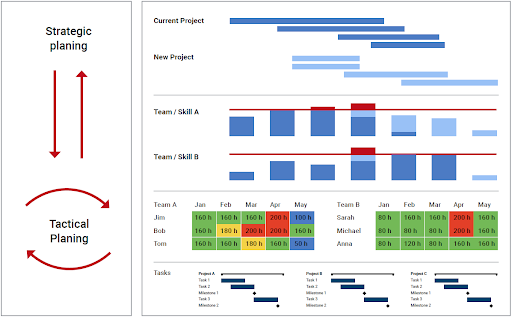From Project to Program Management : Differences and Considerations
Project Management is an organized approach to managing projects within the allotted resources to accomplish the planned objectives. To scale up their careers within or outside the organizations, Project Managers aim to add a skill set, get certifications, and aspire to take the next step.
One of the most immediate approaches is to strive for the transformation from being a project manager to program manager by reflecting upon:
- What steps do we need to progress from project to program management?
- What does the program management expect from them?
- What problems /issues they may encounter in the hierarchy?
- Why and how it is different and difficult?
Let us recap the general understanding of projects and programs, and throw some light on how different they are?

Definitions
Let us take a look at how the Project Management Book of Knowledge ( PMBOK ) defines the two terms.
Project Management -
“Project Management is the application of knowledge, skills, tools, and techniques to project activities to meet the project requirements.”
Program Management -
“Program management focuses on interdependencies within projects and between projects and the program level to determine the optimal approach for managing them. As program management regardless of its domain, contains several projects, positions/roles of project management, so will also be part of program management.”
What does a Program Manager do?
The program manager, therefore, is responsible for delivering the output/result product of the program, which is ultimately managing the portfolio of projects and programs.
They must coordinate with the teams or multiple project managers who are involved in managing their projects. The program manager must possess knowledge on the organizations' monetary strategies as the performance plays a decisive role in organizations’ financial health.
The key responsibilities of program managers include but not limited to:
- Management
- Deliver the organization’s vision
- Integration
- Optimization
- Tracking
- Budgeting
“Program management is the process of managing several related projects, often intending to improve an organization's Performance”. - Wikipedia
Few of the other roles and responsibilities of a program manager as follows:
- Managing the program plan through the life cycle of the program assigned.
- Defining the processes, procedures, reporting structure, program controls to manage and deliver the program.
- Planning the overall program and monitoring its progress across all the projects and ensuring that all the projects are progressing on time managing the program budget, which is the consolidated budget of all the assigned projects and ensuring none of the projects exceed the allocated budget.
- Assessing all the risks associated with the program as a whole and take corrective measures to control and mitigate them.
- Coordinating With the interdependencies between the various projects and programs.
- Manage and use the resources efficiently across different projects/programs.
Project Manager versus Program Manager:
| Program Manager | Project Manager |
| Plan program level activities | Plan project activities and their dependencies |
| Control all stages of the program | Control the project and manage project constraints |
| Manage risks and issues at the program level and delegate to concerned projects | Manage project risks and issues and report to program manager if necessary |
| Frame policies and procedures for the projects | Runs projects as per the set-in policies and procedures |
| Resolve resource conflicts | Use assigned resources |
| Outline program standards | Product/service delivery as per the agreed standards |
Project Management versus Program Management:
| Program Management | Project Management |
| Depend on an organization's' governance | Run-on project's governance |
| Ongoing-longer duration | Has a definite start and end |
| Has a direct impact on organizations' monetary performance | Less impact on organizations' balance sheet |
| Driven by organizations' strategy and influenced by market trends | Run-on change management |
| Encapsulates the scope of its program components | Has defined objectives and scope |
What are the challenges involved?
Transitioning from project to program management is not an easy process and takes time. This has many limitations, such as:
- Within the same organization, existing project managers must elevate themselves to this new role and must establish their recognition before being assigned to a program.
- If hired from outside the organization, he/she would be a greater risk factor, since his/her managerial/leadership skills are not proven. Certainly, it is expensive to trust a new manager if the program proved to be unsuccessful, as it would make a huge impact on the organizations’ business.
- Adapting program management techniques and building that image with the organization is a long process for any individual unless his/her track record is consistently good. This would pave a way for his/her promotion within the existing organization or outside of it.
- Ensuring the individual’s skill sets and competencies align with organizations’ business strategies, is again a test-driven process for the management and consumes more time before entrusting a program to any candidate.
Making the transition from being a Project Manager to a Program Manager:
A Project Manager assigned to deliver the project against a set of pre-defined objectives and timelines, to move up in the hierarchy should look beyond these project management parameters. A change in mindset is required along with a strategic and business approach to move upwards in the organization.
Program managers adopt a strategic approach instead of a tactical approach. This change in mindset helps transition towards adopting new technologies, gather market trends, and understand the need for the role change. Program management is all about understanding the organizations’ business goals and executing those goals.
PMI offers 9 guiding principles that help in transitioning from project to program management. These are briefly explained below:
- Think business instead of delivery: The program manager shifts their focus from project delivery to business delivery to understand the expectations of the customer and market changes while keeping a track of how the organization is reacting to market trends.
- Think dependencies instead of schedule: As we have multiple projects under one program, the performance/delivery of one project might be depending on other projects. Hence, the program manager shifts his/her focus on how different projects are interlinked and manage their dependencies rather than how to schedule and deliver them.
- Think strategy instead of scope: Program management is all about strategic execution. One of the key characteristics should be to understand the organization’s business strategy instead of the project’s scope.
- Think conflict instead of crisis: Conflicts are part of any projects/programs. If not managed constructively, they can have a great impact on the outcome.
- Think governance instead of teams: The governance policy differs from organization to organization. It is very difficult for the program manager to keep the stakeholders engaged unless he/she learns about the organizations’ governing policies.
- Think transition instead of transfer: The core function of program management is to transform the project into the business. Hence, the program manager must see organizations’ initiatives as a business rather than a project, which is delivered and transferred to operations or maintenance.
- Think challenge instead of salary: Though the monetary benefits (compensation) may not be comparable to the challenges, the program manager must consider every assigned program as an opportunity to prove their potential. The focus should be on overcoming the challenges and think about the benefits of being a program manager.
- Think relaxation instead of stress: Positive attitude is the key to program managers’ success and so the program.
- Think program triple constraints: The project focuses on the scope, time, and cost as triple constraints and manages to deliver the project within them. But as a program manager, his/her role is to think about the benefit, customer, and cost as programs’ triple constraints.
Time and effort allocation:

Conclusion:
The world of project management is changing now. The individuals who aspire to scale themselves to program managers need to possess a wide range of skills. They must leave behind the delivery concept and start embracing business concepts.
Project managers are required to establish a healthy relationship with their peers to scale up their careers. They must start understanding customer delivery rather than focusing on delivering a project alone. Instead of a tactical approach, it is important to adopt a strategic approach before being picked for higher responsibility. Hence, organizations should measure their key deliverables constantly to ensure their credibility to take up the new challenge.
Become a certified Project Management Professional. Check out our courses.

